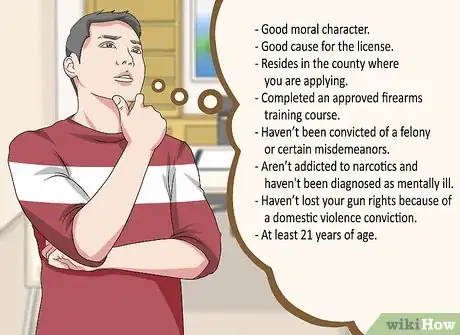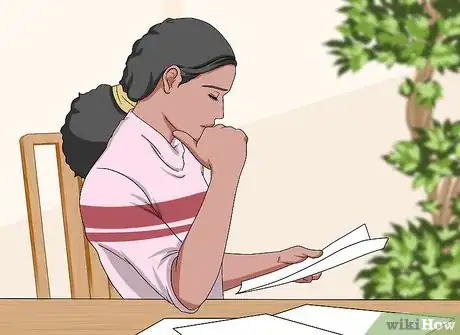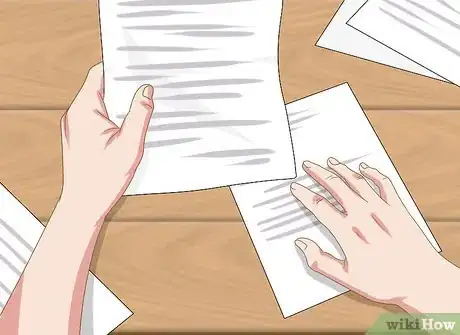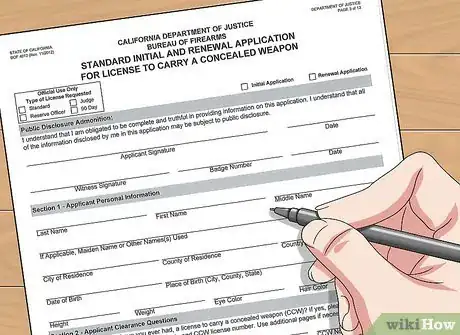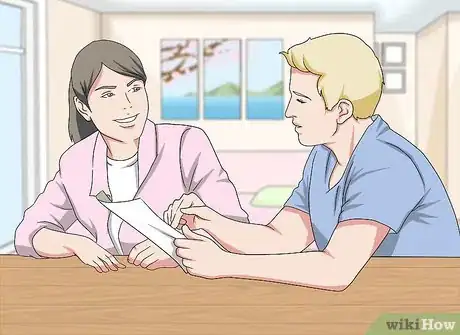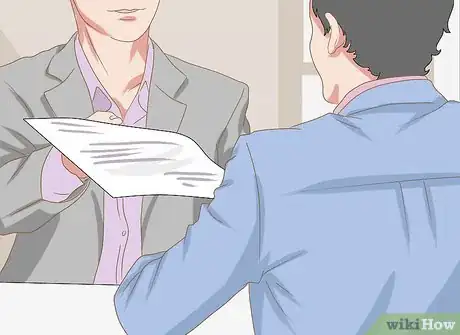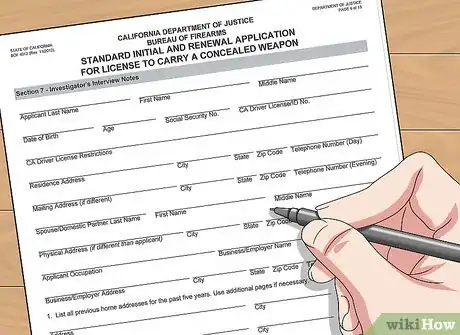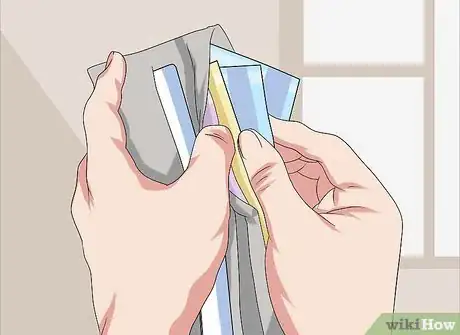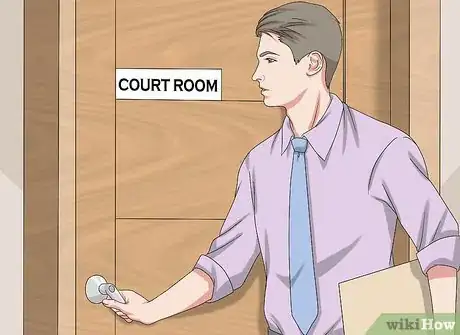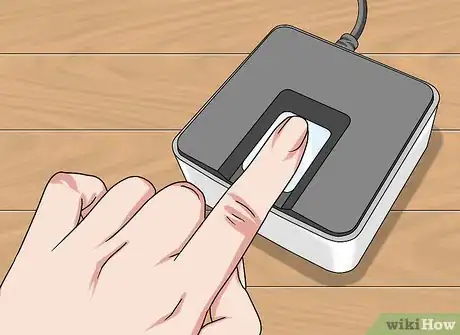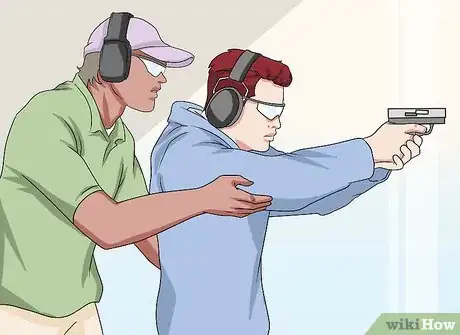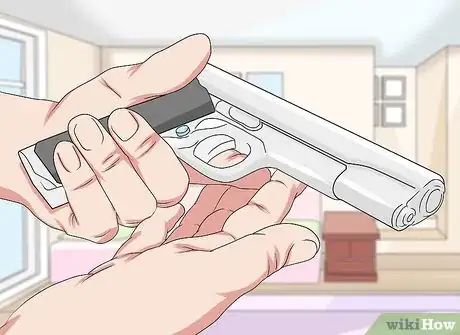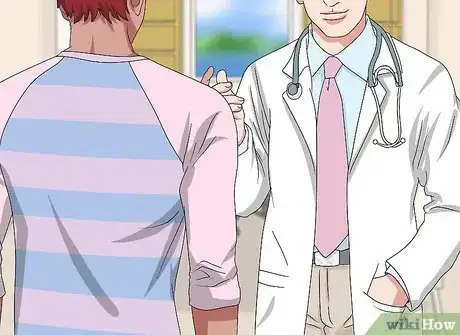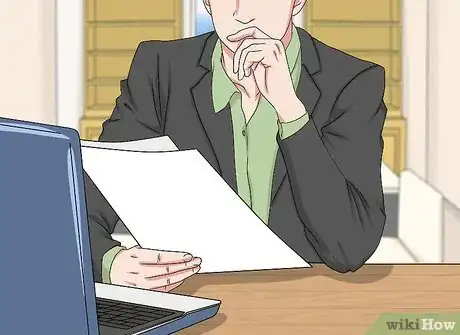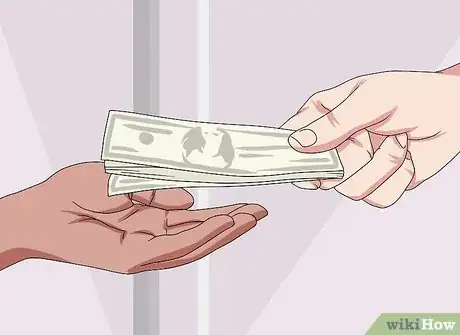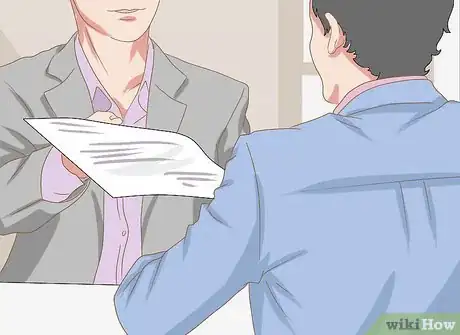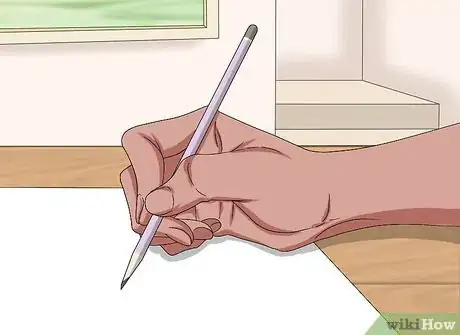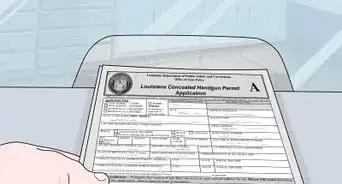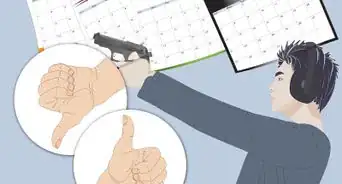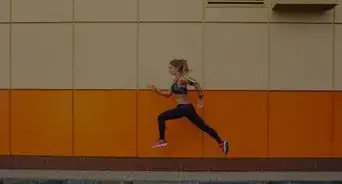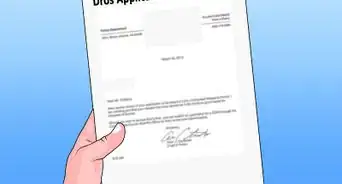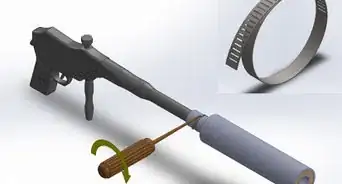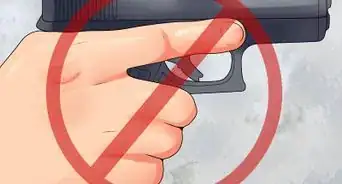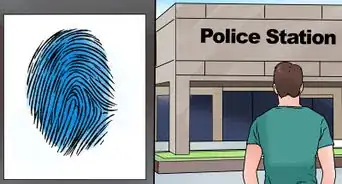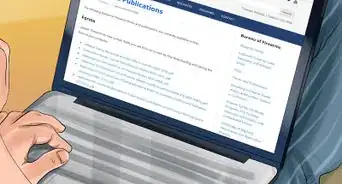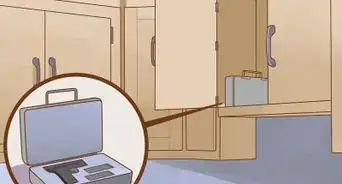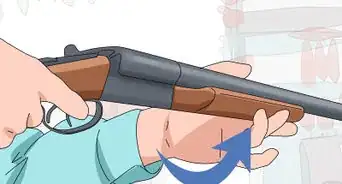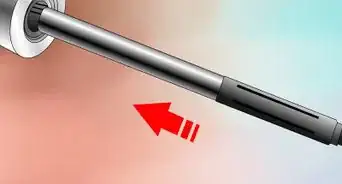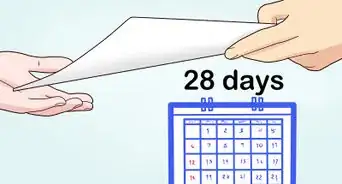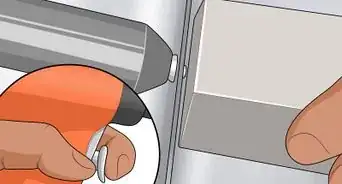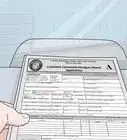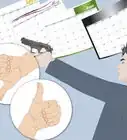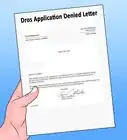This article was co-authored by wikiHow Staff. Our trained team of editors and researchers validate articles for accuracy and comprehensiveness. wikiHow's Content Management Team carefully monitors the work from our editorial staff to ensure that each article is backed by trusted research and meets our high quality standards.
There are 10 references cited in this article, which can be found at the bottom of the page.
wikiHow marks an article as reader-approved once it receives enough positive feedback. In this case, 90% of readers who voted found the article helpful, earning it our reader-approved status.
This article has been viewed 313,682 times.
Learn more...
In California, obtaining a Carry Concealed Weapons (CCW) license is difficult. The sheriff has broad discretion whether to grant you the license. To apply, contact your county sheriff. You’ll have to fill out an application and complete a firearms safety course. Depending on your county, you may also have to undergo psychological testing. If you already have a CCW license from another state, you must apply for a California CCW license.
Steps
Completing an Application
-
1Check if you qualify. You aren’t entitled to a CCW license. In order to qualify, you’ll need to satisfy the following requirements, so check ahead of time:[1]
- You have good moral character.
- You have good cause for the license.
- You reside in the county where you are applying, or the business where you spend a substantial amount of time is in the county.
- You complete an approved firearms training course.
- You haven’t been convicted of a felony or certain misdemeanors.
- You aren’t addicted to narcotics and haven't been diagnosed as mentally ill.
- You haven’t lost your gun rights because of a domestic violence conviction.
- You are at least 21 years of age. (Some states make exceptions for those under 21.)
-
2Contact your county sheriff’s office. There is no central office that awards CCW licenses. Instead, you must contact your county sheriff’s office. They should provide you with a checklist of documents or another handout that explains the application process.
- If you live in an incorporated city, you can also apply with the police department for that city.
Advertisement -
3Read the restrictions. You’ll need to provide a signed acknowledgement of restrictions as part of your application. Accordingly, read up on what California law requires of those with a CCW license. You can find this information in Section 4 of the application.
- For example, you can’t consume alcohol while carrying your weapon or be in a bar with the weapon.
- You also must show the license to an officer when requested.
-
4Gather the required documents. The sheriff’s office will request certain documents from you. Refer to your application instructions. For example, in Riverside County, you’ll need to provide the following:
- birth certificate or naturalization papers
- color copy of a valid driver’s license
- proof that you live in the county (e.g., utility bills)
- military discharge DD214 (if applicable)
- two recent passport photos
- employer statement and signed approval (if applying for your job)
- proof of employer-employee relationship (if applying for your job)
-
5Obtain your character references. Your county might require reference letters from people who know you. Don’t choose family members or employers as your references. The person writing the letter should include their contact information and explain that they are aware you are applying for a CCW permit.
-
6Complete the California DOJ application. The California Department of Justice has a standard initial application you must complete. You can download the form and type in your information. Use additional pages if you need extra space.
- Complete sections 1 through 5.
- Ask whether you should complete the other sections in the presence of an official. Each county is a little bit different in what they require.
-
7Explain your good cause for the license. Good cause is difficult to prove unless you are applying for the license as part of a job. For example, you might want to carry a weapon for personal safety because someone has physically threatened you. Depending on your county, this might not be sufficient reason.[2] On your application, go into as much detail as possible, including the following details:
- dates and times of any incident
- the location of the incident
- names of police or other authorities involved
- copies of police reports or restraining orders
- verified statements from witnesses
-
8Submit your application. In some counties, you’ll submit the application online.[3] In other counties, you’ll submit the application when you attend your interview. Read your county’s instructions to see how you should submit.
- You may also need to scan and upload supporting documents, such as your utility bill or birth certificate.[4]
Attending an Interview
-
1Prepare for your interview. After you submit your application, you’ll schedule an interview. To prepare, read the questions in Section 7 of the application and prepare your answers.
- For example, you’ll be asked whether you have ever been in a mental institution or if you’ve ever been addicted to alcohol or drugs.
- You’ll also be asked about any criminal history involving firearms and domestic violence.
- Also prepare to talk about why you have good cause for getting a CCW license.
-
2Bring checks or money orders. Typically, you need to pay a portion of your administrative/background check fee at the time of your interview.[5] Refer to the instructions for the amount.
- You may also have to pay for your fingerprinting at the interview.
-
3Attend your interview. At your interview, you’ll discuss your criminal history and why you need a license. You’ll also talk about the consequences of publicly carrying a firearm.[6]
- Arrive at least 15 minutes ahead of time for processing, and remember not to bring any weapons or bags with you.[7]
- If you can’t make the interview, call the sheriff’s office as soon as possible to reschedule.
-
4Give fingerprints. After your interview, you will be told where to go to have your fingerprints taken. The fingerprints will then be sent to the sheriff’s office. Ask if you need to pay when you have your prints taken.
Completing Other Requirements
-
1Ask for preapproval. You should obtain pre-approval before you take the safety course and complete your weapons qualification. Pre-approval will save you time in case you don’t qualify for a license.
-
2Take a firearms safety course. All applicants must take the state’s Firearms Safety Class. The sheriff should have a list of pre-approved courses you can take. Generally, you will take a 16 hour course on firearm safety or a 24-hour community college course.
-
3Complete your weapons qualification. You can get a CCW license for more than one weapon. The county will set the maximum. Before approval, you must show that you can safely handle your weapons. Arrive at the firing range with all weapons you intend to qualify and make sure they are not loaded.
- You must fire your weapon at the range and pass with a score of 70% or better.
- For example, you will shoot at two targets from the “low ready” position at the 15-, 10-, and 7-yard lines.
- Your holsters will be checked to make sure they have an acceptable thumb snap.
-
4Attend psychological testing, if necessary. Your county may require that you complete psychological testing before they award you a CCW license. If testing is required, you should be referred to a licensed psychologist.
- You’ll have to pay for the testing, but it shouldn’t be more than $150.
-
5Await your results. The sheriff’s office will analyze your application after you submit it. The processing time differs depending on the county. However, you could be in for a long wait.
- In Placer County, for example, applicants generally wait six months or more for their applications to be processed.[8]
- Contact your county sheriff’s office to check on wait times.
-
6Pay the remaining administrative fee. You paid a portion (usually 20%) when you submitted your application. Typically, you’ll pay the remaining 80% when you receive your CCW license.[9]
-
7Update your application if you move. If you move within the same county, notify the sheriff’s office of your new address. Don’t delay. State law requires that you provide written notice within 10 days. You may also have to complete a modification form and go into the office to have your license updated.[10]
- If you move outside the issuing county, then tell them you have moved. You may have to surrender your license, depending on the circumstances.[11]
-
8Renew in a timely manner. Don’t wait for your license to expire before renewing. You’ll be breaking the law if you continue to carry with an expired license. Submit your renewal application 30-45 days before the expiration to give yourself enough time.[12]
- You’ll need to take a four-hour CCW renewal course.[13] Check with your county sheriff for a full list of requirements.
Community Q&A
-
QuestionI lost my handgun safety course card. How can I get a replacement?
 Community AnswerContact the issuing authority for a replacement. There may be a nominal fee for the replacement card.
Community AnswerContact the issuing authority for a replacement. There may be a nominal fee for the replacement card. -
QuestionCan I apply for a C.C.W. permit if I was arrested in past for C.C.W. without a permit?
 Community AnswerYes, assuming you were not charged with a weapons-related felony for carrying without a permit.
Community AnswerYes, assuming you were not charged with a weapons-related felony for carrying without a permit. -
QuestionIs there a list of handguns that are allowed or not allowed in California for concealed carry with a CCW permit?
 Community AnswerCheck with your nearest gun shop. They'll know what's allowed and what's not.
Community AnswerCheck with your nearest gun shop. They'll know what's allowed and what's not.
References
- ↑ http://www.shouselaw.com/concealed-weapon.html
- ↑ http://www.shouselaw.com/concealed-weapon.html
- ↑ http://cms.sbcounty.gov/Portals/34/CCW%20Forms/ccwinst.pdf
- ↑ http://www.sacsheriff.com/Pages/Organization/SIIB/CCWFaq.aspx
- ↑ http://cms.sbcounty.gov/Portals/34/CCW%20Forms/ccwinst.pdf
- ↑ http://www.shouselaw.com/concealed-weapon.html
- ↑ http://media.ocgov.com/gov/sheriff/about/info/services/ccw/initial_application.asp
- ↑ https://www.placer.ca.gov/departments/sheriff/concealed-weapon-permits/ccwfaq
- ↑ http://cms.sbcounty.gov/Portals/34/CCW%20Forms/ccwinst.pdf
- ↑ https://www.placer.ca.gov/departments/sheriff/concealed-weapon-permits/ccwfaq
- ↑ https://leginfo.legislature.ca.gov/faces/codes_displayText.xhtml?lawCode=PEN&division=5.&title=4.&part=6.&chapter=4.&article=
- ↑ http://www.sacsheriff.com/Pages/Organization/SIIB/CCWFaq.aspx
- ↑ https://www.placer.ca.gov/departments/sheriff/concealed-weapon-permits/modify-renew-ccw-permit
- ↑ https://www.placer.ca.gov/departments/sheriff/concealed-weapon-permits/ccwfaq
About This Article
To apply for a CCW in California, ask your county sheriff's office for a list of required documents and an explanation of the application process. Gather all the documents they ask for, as well as some character references, and complete the California DOJ application. You will also need to explain why you need the license, like for a job or because someone threatened you. Once you have gathered all of that information, submit it and wait for an interview. Keep reading for tips on passing the interview and handling the other requirements.
